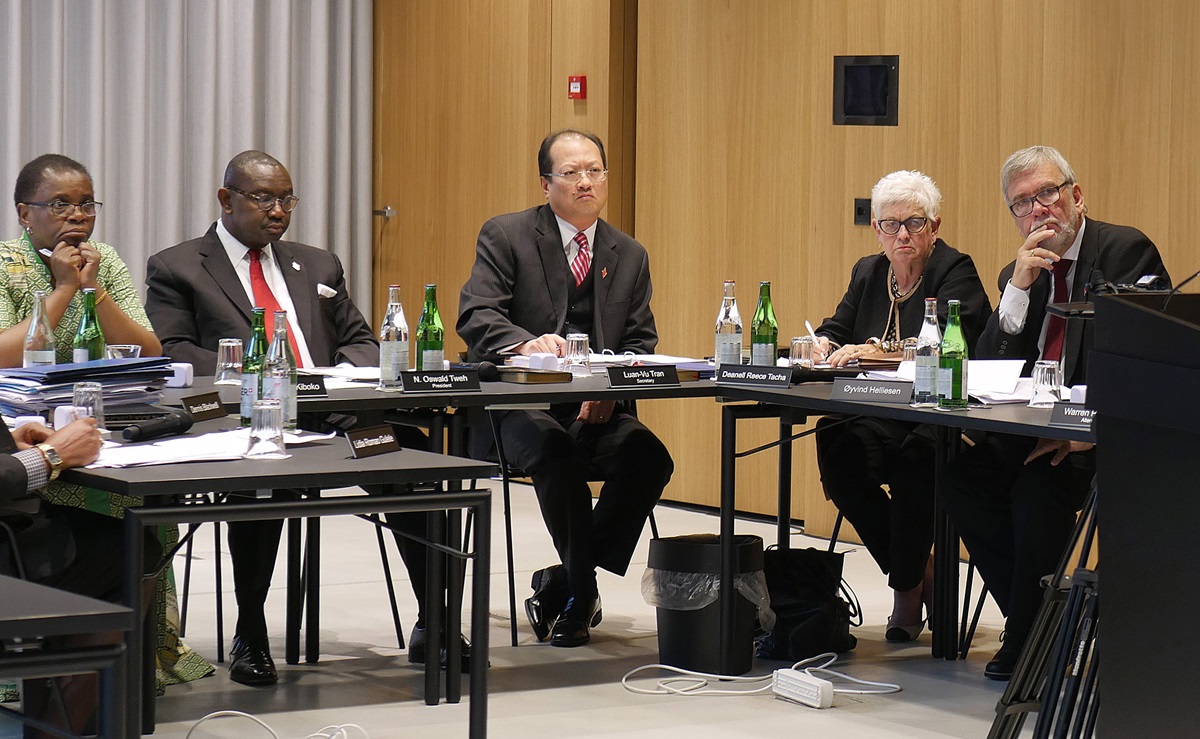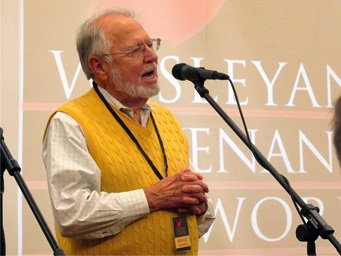Modifications could be coming to the Modified Traditional Plan.
Proponents of the Traditional Plan and its related modified version have offered revisions to the legislation heading to the special General Conference on Feb. 23-26.
Meanwhile, backers of the One Church Plan are recommending deleting three sentences in that legislation.
The goal, for all three plans, is to address constitutional issues that the Judicial Council, The United Methodist Church’s top court, identified in a ruling last year.
The plans are among the proposals offering very different directions for the denomination as it navigates a potentially church-splitting divide over homosexuality.
To take effect, any legislative changes will need to be brought to the floor and approved by a majority of delegates when the denomination’s legislative assembly meets in St. Louis.
In its unanimous Decision 1366, the Judicial Council found the One Church Plan largely in line with the denomination’s constitution, but found more constitutional issues with the Traditional Plan. Both plans emerged from the work of the bishops-appointed Commission on a Way Forward.
The Judicial Council opted not to rule on a third commission proposal, the Connectional Conference Plan, because it already involved multiple amendments to the denomination’s constitution.
How will General Conference decide?
The Commission on General Conference — the body that plans the big meeting — has announced a process to help delegates prioritize legislation.
On the first day of legislative action, Feb. 24, delegates will basically be asked to rank the plans and petitions they would like to focus on. Delegates will consider petitions that comprise a plan as one unit and petitions that are not part of a plan individually.
The plans and petitions will be listed one at a time on the video screens in numerical order by petition numbers. Delegates will then be able to indicate whether they consider each a high priority or a low priority by pressing either 1 or 2 on their voting device.
Results of the ranking will not be shown until completion of the process for all plans and petitions. At that time, the outcome of all the rankings will be projected, with all plans and petitions listed by percentage.
On Feb. 25, the day all delegates meet together in legislative committee, they will work on perfecting plans and petitions in order of priority. Legislation receiving an affirmative vote will be brought to the plenary floor on Feb. 26 for further debate and final votes.
Read press release
Read about the broad outlines of this General Conference
On the first day of legislative action, Feb. 24, delegates will basically be asked to rank the plans and petitions they would like to focus on. Delegates will consider petitions that comprise a plan as one unit and petitions that are not part of a plan individually.
The plans and petitions will be listed one at a time on the video screens in numerical order by petition numbers. Delegates will then be able to indicate whether they consider each a high priority or a low priority by pressing either 1 or 2 on their voting device.
Results of the ranking will not be shown until completion of the process for all plans and petitions. At that time, the outcome of all the rankings will be projected, with all plans and petitions listed by percentage.
On Feb. 25, the day all delegates meet together in legislative committee, they will work on perfecting plans and petitions in order of priority. Legislation receiving an affirmative vote will be brought to the plenary floor on Feb. 26 for further debate and final votes.
Read press release
Read about the broad outlines of this General Conference
The plans all involve multiple petitions, each of which to seeks to alter different parts of the Book of Discipline — the denomination’s policy book. The original proposed petitions, without the recommended revisions, can be found in the Advance Daily Christian Advocate.
At present, the Discipline prohibits “self-avowed practicing” gay clergy and the blessing of same-sex unions. However, a number of United Methodists have publicly violated these prohibitions.
The Traditional Plan would impose mandatory penalties on those who do not adhere to church law that prohibits self-avowed practicing homosexuals from serving as clergy and clergy from officiating at same-sex weddings.
The One Church Plan would leave questions of LGBTQ ordination up to conferences and same-gender weddings up to local churches and individual clergy. It would add protections for bishops and clergy who as a matter of conscience cannot officiate at such ordinations or unions.
The Judicial Council found the 17 petitions in the One Church Plan to be constitutional, except for one individual sentence each in three petitions. Proponents of the One Church Plan say those sentences simply can be dropped without changing the nature of the proposal.
“I think the One Church Plan remains the plan for unity in The United Methodist Church that honors the consciences of all and creates for us a future with hope,” said the Rev. Tom Berlin, who submitted the legislation on behalf of the Way Forward Commission. The plan has support from a majority of bishops as well as affirmation from the majority of Way Forward Commission members.
The Rev. Thomas Lambrecht, who submitted the Traditional Plan on behalf of the commission, said that plan and the related modified version ensure church unity in teaching and practice.
“We believe in issues of sexual morality, there needs to be one standard for the whole church,” he said. Over the last five years, he said, he has seen the beginnings of schism within the denomination.
“To restore unity, we need to return to operating under a single standard,” he said. “Sexual morality is a very important component of the Christian life both scripturally and in personal experience.”
The Judicial Council upheld the Traditional Plan’s mandatory penalties for officiating at same-sex unions as constitutional. However, the court ruled that certain portions of the plan strayed from the constitution on matters of due process and by elevating adherence to requirements related to homosexuality above all other requirements.
Of the plan’s 17 petitions, the court ruled seven unconstitutional and identified unconstitutional portions in two others.
Lambrecht on Feb. 1 announced revisions to that plan and related parts in the Modified Traditional Plan to bring them in line with the ruling.
Specifically, he and other plan supporters recommended dropping three petitions that created a new body, the council relations committee, within the Council of Bishops to hold fellow bishops accountable.
Instead, plan backers are suggesting a substitution of a Modified Traditional Plan petition that creates a new Global Episcopacy Committee to hold bishops and conferences accountable.
That petition would also need to be amended to delete reference to the council relations committee.
Plan backers also suggested revising a Traditional Plan petition related to ordination that inadvertently omitted the word “practicing” from the phrase “self-avowed practicing homosexual.”
Several revisions to the Traditional and Modified Traditional plans also would require the upholding of the Discipline in its entirety.
Lambrecht and other backers suggest substituting part of the Traditional Plan with a petition from the Modified Traditional Plan that deals with implementation of provisions.
The petition, with recommended changes, requires bishops and conferences to certify that they would uphold, enforce and maintain all Disciplinary standards. The petition additionally requires that beginning in 2021, the General Council on Finance and Administration — the denomination’s finance agency — neither receive nor send funds to conferences that do not pledge to uphold the Discipline until they form a self-governing church.
Similarly, the petition says that bishops who cannot affirm their willingness to uphold and enforce the Discipline would not receive money from the general church for expenses such as for travel, their office or housing.
The plan also requires the finance agency to stop these conferences from using the United Methodist name and the cross and flame insignia except under a concordat agreement. It says that conferences that choose to withdraw from The United Methodist Church would receive a one-time grant of $200,000 to help defray transitional expenses.
The modified version also requires provisions to take effect at the adjournment of the special General Conference, rather than Jan. 1, 2020.
Finally, Lambrecht urges delegates to pass one of the submitted exit plans that allows congregations to depart the denomination without seeking approval of its annual conference.
The Judicial Council will be present at the special General Conference and could be asked again to weigh in on legislation.
Under the denomination’s constitution, one-fifth of General Conference delegates or a majority of bishops can ask the Judicial Council to rule on the constitutionality of any General Conference action.
Hahn is a multimedia news reporter for United Methodist News Service. Contact her at (615) 742-5470 or newsdesk@umcom.org. To read more United Methodist news, subscribe to the free Daily or Weekly Digests.
Like what you're reading? Support the ministry of UM News! Your support ensures the latest denominational news, dynamic stories and informative articles will continue to connect our global community. Make a tax-deductible donation at ResourceUMC.org/GiveUMCom.




